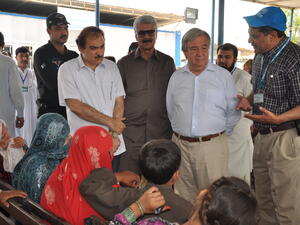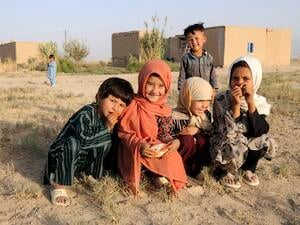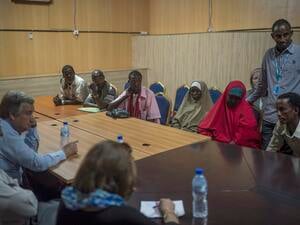UNHCR chief in Eid solidarity visit to Horn of Africa
UNHCR chief in Eid solidarity visit to Horn of Africa
UN High Commissioner for Refugees António Guterres is on a three-day visit to the Horn of Africa to show solidarity with displaced Somalis during Eid il-Fitr.
Over the Eid period, UNHCR is airlifting 240 metric tonnes of aid from Saudi Arabia to Somalia. The assistance comprises dry goods and special Eid packages of ready-to-eat meals, orange juice, sweets and biscuits. Our partner Islamic Relief will distribute the packages to internally displaced Somalis and the urban poor in Mogadishu and Lower Shabelle region.
The goal remains to provide as much aid as possible within Somalia so that people affected by famine and conflict will not have to undertake the arduous journey to neighbouring countries in search of assistance.
While the Somali outflow into Ethiopia and Kenya has slowed, the camps continue to face challenges with the recent arrivals. In Ethiopia's Dollo Ado area, Kobe camp has seen a slight decrease in the overall mortality rate (from 5.7 deaths/10,000 people/day last week to 4.9/10,000/day this week) but a worrying rise in deaths among children under five years of age (from 12.9/10,000/day last week to 15.3/10,000/day this week). According to our partner agency MSF, measles is the main cause of deaths in Kobe camp, accounting for 68 per cent of deaths. Other contributing factors are malnutrition, pneumonia and diarrhea.
Although health services and nutritional feeding programmes are available, parents are not taking their children for continuing treatment. Decentralization of services therefore remains a key priority in addressing high mortality rates. In addition to the community outreach programme, UNICEF's mobile health clinic will this week start work in Kobe camp to encourage refugees to access the medical facilities available.
A UNHCR airlift arrived in Addis Ababa last weekend, bringing aid for up to 20,000 Somali refugees in the Gode area, 250 km north-east of Dollo Ado. Trucks have been loaded with supplies such as plastic sheets, blankets and sleeping mats. It could take about four days for the trucks to cover some 1,400 km of mostly rough roads leading to Gode in the current rainy season.
Meanwhile in Kenya's Dadaab refugee complex, some 30,000 recent arrivals have so far been moved from the outskirts to the Ifo Extension and Kambioos sites. We continue to pitch new rows of tents, and focus on the immediate provision of basic hygiene services, namely by installing water systems and digging latrine pits.
The sandy nature of the soil poses a number of logistical challenges as standard pegs for tents may not hold in case of strong winds and latrine pits can cave in if not additionally strengthened. Another hurdle is the condition of local roads, which in some locations are barely passable paths in the sand. This makes movements of heavy machinery - necessary to drill the sufficient number of boreholes - extremely difficult. Meanwhile potable water has to be trucked daily from a number of existing boreholes to Kambioos and Ifo Extension.
For further information on this topic, please contact:







